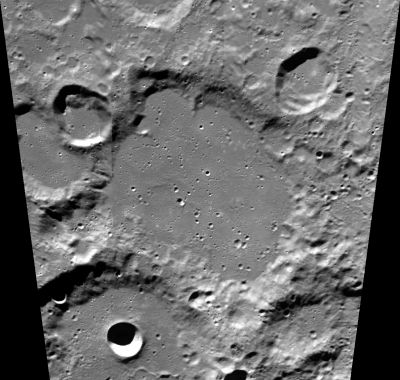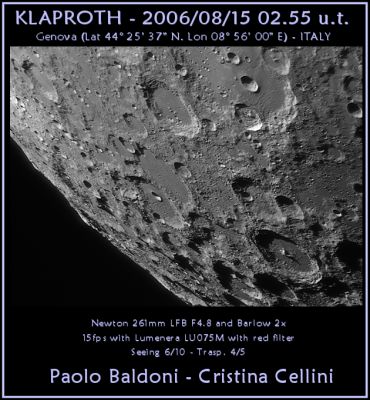Difference between revisions of "Klaproth"
| (One intermediate revision by the same user not shown) | |||
| Line 5: | Line 5: | ||
Lat: 69.8°S, Long: 26.0°W, Diam: 119 km, Depth: 2.77 km, [[R%C3%BCkl%2072|Rükl: 72]]<br /> | Lat: 69.8°S, Long: 26.0°W, Diam: 119 km, Depth: 2.77 km, [[R%C3%BCkl%2072|Rükl: 72]]<br /> | ||
|} | |} | ||
| − | [http://www.lpod.org/coppermine/displayimage.php?pid=722&fullsize=1 [[Image: | + | [http://www.lpod.org/coppermine/displayimage.php?pid=722&fullsize=1 [[Image:Normal_klaproth-clem1.jpg|external image normal_klaproth-clem1.jpg]]][http://www.lpod.org/coppermine/displayimage.php?pid=976&fullsize=1 [[Image:Normal_klaproth_20060815_0255_bald.jpg|external image normal_klaproth_20060815_0255_bald.jpg]]]<br /> ''[http://lpod.org/coppermine/displayimage.php?pos=-722 Clementine] [http://lpod.org/coppermine/displayimage.php?pos=-976 Paolo Baldoni & Cristina Cellini]''<br /> <br /> <div id="toc"> |
| − | + | ||
| − | |||
==Images== | ==Images== | ||
[http://www.lpod.org/coppermine/thumbnails.php?album=search&type=full&search=Klaproth LPOD Photo Gallery] [http://www.lpi.usra.edu/resources/lunar_orbiter/bin/srch_nam.shtml?Klaproth%7C0 Lunar Orbiter Images] [http://www.lpi.usra.edu/resources/apollo/search/feature/?feature=Klaproth Apollo Images]<br /> <br /> | [http://www.lpod.org/coppermine/thumbnails.php?album=search&type=full&search=Klaproth LPOD Photo Gallery] [http://www.lpi.usra.edu/resources/lunar_orbiter/bin/srch_nam.shtml?Klaproth%7C0 Lunar Orbiter Images] [http://www.lpi.usra.edu/resources/apollo/search/feature/?feature=Klaproth Apollo Images]<br /> <br /> | ||
| Line 13: | Line 12: | ||
''([[LAC%20zone|LAC zone]] 137A4)'' [http://planetarynames.wr.usgs.gov/images/Lunar/lac_137.pdf USGS Digital Atlas PDF]<br /> <br /> | ''([[LAC%20zone|LAC zone]] 137A4)'' [http://planetarynames.wr.usgs.gov/images/Lunar/lac_137.pdf USGS Digital Atlas PDF]<br /> <br /> | ||
==Description== | ==Description== | ||
| − | Klaproth is an easy to identify crater, but there isn't much to see once you've found it. Like many craters in the southern highlands it is old with worn rim, smoothed out terraces, flat floor that is obviously younger than the rim, and no central peak. On it's floor, [http://www2.lpod.org/wiki/August_5,_2006 low Sun images] show some low mare-type ridges which are probably draped over pre-existing floor craters buried by the smooth material. Klaproth has been overlapped by Casatus to the south, which make the pair of craters easily recognized when observing.<br /> <span class="membersnap">- | + | Klaproth is an easy to identify crater, but there isn't much to see once you've found it. Like many craters in the southern highlands it is old with worn rim, smoothed out terraces, flat floor that is obviously younger than the rim, and no central peak. On it's floor, [http://www2.lpod.org/wiki/August_5,_2006 low Sun images] show some low mare-type ridges which are probably draped over pre-existing floor craters buried by the smooth material. Klaproth has been overlapped by Casatus to the south, which make the pair of craters easily recognized when observing.<br /> <span class="membersnap">- tychocrater <small>Jul 15, 2007</small></span><br /> <br /> |
==Description: Elger== | ==Description: Elger== | ||
| − | ''([[IAU% | + | ''([[IAU%20directions|IAU Directions]])'' KLAPROTH.--[[Casatus|Casatus]] partially overlaps this still larger but less massive formation on its S.W. flank. The walls of Klaproth are much lower and very irregular and broken, especially on the E. There are some ridges on the floor. The neighbouring region is covered with unnamed objects, large and small.<br /> <br /> |
==Description: Wikipedia== | ==Description: Wikipedia== | ||
[http://en.wikipedia.org/wiki/Klaproth_(crater) Klaproth]<br /> <br /> | [http://en.wikipedia.org/wiki/Klaproth_(crater) Klaproth]<br /> <br /> | ||
==Additional Information== | ==Additional Information== | ||
| − | Depth data from [[Kurt%20Fisher% | + | Depth data from [[Kurt%20Fisher%20Crater%20Depths|Kurt Fisher database]]<br /> |
* Westfall, 2000: 2.77 km | * Westfall, 2000: 2.77 km | ||
* Viscardy, 1985: 4.3 km | * Viscardy, 1985: 4.3 km | ||
| Line 31: | Line 30: | ||
<br /> <br /> | <br /> <br /> | ||
---- | ---- | ||
| − | + | </div> | |
Latest revision as of 01:55, 16 April 2018
Contents
Klaproth
|
Lat: 69.8°S, Long: 26.0°W, Diam: 119 km, Depth: 2.77 km, Rükl: 72 |


Clementine Paolo Baldoni & Cristina Cellini
Images
LPOD Photo Gallery Lunar Orbiter Images Apollo Images
Maps
(LAC zone 137A4) USGS Digital Atlas PDF
Description
Klaproth is an easy to identify crater, but there isn't much to see once you've found it. Like many craters in the southern highlands it is old with worn rim, smoothed out terraces, flat floor that is obviously younger than the rim, and no central peak. On it's floor, low Sun images show some low mare-type ridges which are probably draped over pre-existing floor craters buried by the smooth material. Klaproth has been overlapped by Casatus to the south, which make the pair of craters easily recognized when observing.
- tychocrater Jul 15, 2007
Description: Elger
(IAU Directions) KLAPROTH.--Casatus partially overlaps this still larger but less massive formation on its S.W. flank. The walls of Klaproth are much lower and very irregular and broken, especially on the E. There are some ridges on the floor. The neighbouring region is covered with unnamed objects, large and small.
Description: Wikipedia
Additional Information
Depth data from Kurt Fisher database
- Westfall, 2000: 2.77 km
- Viscardy, 1985: 4.3 km
- Cherrington, 1969: 3.1 km
Nomenclature
Martin Heinrich Klaproth (1 December 1743 – 1 January 1817) was a German chemist and mineralogist. Klaproth was the leading chemist of his time in Germany. An exact and conscientious worker, he did much to improve and systematize the processes of analytical chemistry and mineralogy. He was the first to discover uranium, zirconium and titanium, and to characterize them as distinct elements, and he elucidated the composition of numerous substances, including compounds of the then newly recognized elements: tellurium, strontium, cerium and chromium.
LPOD Articles
Unknown Klaproth
On Top of the World
Bibliography